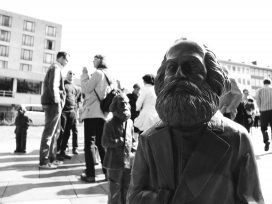The impact of the credit crisis here in New York on people’s everyday lives is hard to discern as yet, other than anecdotally, but it is doubtless both vast and deep. The newspapers carry troubling stories. Thus the New York Times reports on Tylor Pappas, living in a three-bedroom house in a New Jersey suburb – “Forty-three years old. Neither rich nor poor. With a wife, Holly; the two boys; a small business of his own in Manhattan”, managing advertising campaigns and producing videos for clients, “intelligent, well-informed, in good standing with society and, like so many of us, not quite sure what to do as his life savings shrink by the day. ‘This is insane,’ he says,” staring (the reporter writes) into “the pixilated abyss: ‘We’re watching our money evaporate. I don’t have any confidence in what I’m being told. I have zero confidence.'”
One of my NYU students described to me the agitated, aggressive behaviour of subway commuters who work in Wall Street on the day the crisis broke. Some couldn’t bear to travel on the train and took taxis instead. But a psychiatrist friend of mine, whose clients range across the social classes, told me of her impression that as yet people are still rallying around, as they did after 9/11, glued to their television sets and feeling a togetherness in a shared but scarcely understood disaster.
To gain some grasp on what might be happening, perhaps we might turn to the French sociologist Emile Durkheim, whose classic study of suicide, published in 1897, developed the notion of anomie. He first expounded this idea in his book The Division of Labour in Society, in which he treats it as an “abnormal” form that the division of labour takes in modern industrial societies. But in Suicide anomie plays a central role as a social cause of suicide and one of the principal ills of modern industrial society.
Anomie signifies the breakdown of the normative frameworks of our lives, the upsetting of rules, expectations, one’s sense of one’s place in society, one’s status vis-à-vis others, a social condition with grave psychological effects, leading in extreme cases to suicide. In fact, one could say that Durkheim’s book is not really about suicide, but rather about the distinctively modern condition, ever more present in advanced industrial societies (read capitalism), that induces a distinctive kind of suffering – a pathology that is at once social and psychological, that occurs in the economy at times of booms and busts, and of which the index is a high and rising suicide rate.
Durkheim called anomie “the malady of infinite aspiration”. His central idea was that human beings need regulation – a framework of informal and formal rules that set limits to what they are entitled to expect, for instance, in the form of economic rewards. It is an idea that contrasts sharply with the culture of capitalism, not least its US version. Could there be any more striking contrast with his idea than the culture of Wall Street and the City of London in the last three decades? Durkheim, who was a late-ninetheenth-century socialist, hoped to “moralise” capitalism – a notion that has, perhaps, a somewhat conservative ring. But recall RH Tawney, egalitarian socialist, who once wrote a pamphlet called The Sickness of the Acquisitive Society.
Anomie, for Durkheim, manifests itself in times of economic disasters, when
a kind of declassement occurs, suddenly thrusting certain individuals into a situation inferior to the one they occupied hitherto. They must therefore lower their demands, restrain their wants, learn greater self-control […| they are not adjusted to the condition imposed on them and they find its very prospect intolerable; thus they experience suffering.
And it is also found during crises of prosperity when the scale regulating needs
is upset; but a new scale cannot be improvised […]. One no longer knows what is possible and what is not, what is just and what is unjust, which claims and expectations are legitimate and which are immoderate. As a result there is no limit to men’s aspirations […] appetites, no longer restrained by a disoriented public opinion, no longer know where to stop.
Moreover,
Because prosperity has increased, desires are heightened […]. But their very demands make it impossible to satisfy them. Overexcited ambitions always exceed the results obtained, whatever they may be; for they are not warned that they must go no further. Nothing, therefore, satisfies them and all this agitation is perpetually maintained without abatement. Moreover, since this race toward an unattainable goal can afford no other pleasure than the race itself, if pleasure it is, once it is interrupted, one is left quite empty-handed. At the same time, the struggle grows ever more violent and painful, both because it is less regulated and because the competition is more keen. All classes are set against one another because there is no longer any established classification. Effort grows just when it is least productive. How, in these conditions, can the will to live not weaken?
Durkheim thought that we all need social or moral regulation – rules, or norms, that set limits to what are otherwise limitless and destructive desires: from “top to bottom of the scale, greed is aroused unable to find ultimate foothold. Nothing could calm it, since its goal is infinitely beyond all it can attain.” But he also thought that we all need social integration: we need to be attached to social groups and to the wider society. The lack of such integration is a further pathological condition (which he called egoism, meaning social isolation or detachment) leading to rising suicides, which is why, he argued, the suicide rate goes down during wartime and at moments of national crisis, when people pull together and feel the strength of social bonds. Solidarity in the face of a commonly experienced danger is, he thought, a protection against suicide.
So perhaps my psychiatrist friend was on to something. Perhaps, last week anyway, we were still in the 9/11 stage of this credit meltdown and perhaps the anomie of the bust that has followed the unprecedented boom of the last three decades is yet to come. The boom was, of course, highly unequal in its impact, manifested at the extreme in the wildly extravagant incomes and kickbacks of corporate executives and bankers and all those dealers in ever more recondite financial instruments. Their free-for-all rampage was enabled by a lack of regulation – that is, oversight and control by legally assigned regulatory bodies. This all the newspapers and commentaries have repeatedly pointed out. What Durkheim adds is the observation that moral regulation was absent and, indeed, never even contemplated. As for the bust, now beginning, its consequences may well be anomic in the way that Durkheim described, but we should recall, from the history of the Great Depression, that solidarities of the disadvantaged can also develop. But then there were active and flourishing labour unions and a degree of cross-class solidarity encouraged by the New Deal.
What did Durkheim have to suggest in the way of policies and institutional reforms that could counteract the anomie he so vividly described? Here we should, in all fairness, recall that he was writing at the end of the nineteenth century – a time in which one could be optimistic about the coming together of economic, social and moral progress. He thought that moral education could help to counteract the ethos of unlimited acquisitiveness. More helpfully, perhaps, he envisaged institutional reforms that would develop solidarities based on people’s occupational lives – not, of course, class-consciousness in the Marxist sense, but cross-class solidarities that would bind workers and employers in a mutual commitment to shared norms of fairness. One can discern elements of this idea in various twentieth-century developments, such as attempts at national incomes policy in Scandinavia and Britain and forms of worker-management cooperation in Germany.
It seems to me that many questions about the future of capitalism as we have known it are raised by the current economic crisis. Already various developments that were unthinkable in the United States have become accepted as necessary: state part-ownership of financial institutions, massive state involvement in regulating financial markets, and so on. European leaders are already pronouncing American-style capitalism in some way inferior to a supposedly morally superior European variant. Thus President Sarkozy of France has said that the world needs to “bring ethics to financial capitalism”. Will we start to consider the morality of capitalism as a matter of wide-ranging public debate? If so, there could be no better place to start the discussion than Durkheim’s Suicide.






